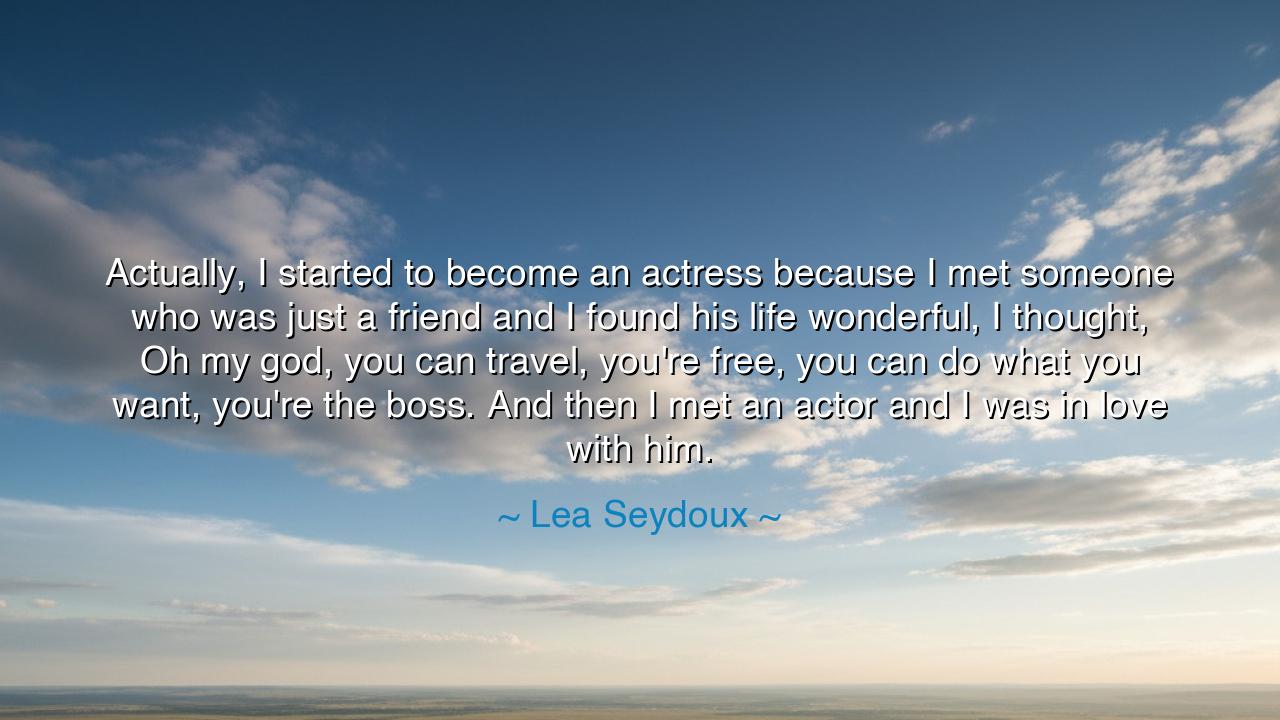
Actually, I started to become an actress because I met someone
Actually, I started to become an actress because I met someone who was just a friend and I found his life wonderful, I thought, Oh my god, you can travel, you're free, you can do what you want, you're the boss. And then I met an actor and I was in love with him.






In the words of Léa Seydoux: “Actually, I started to become an actress because I met someone who was just a friend and I found his life wonderful, I thought, Oh my god, you can travel, you're free, you can do what you want, you're the boss. And then I met an actor and I was in love with him.” This confession speaks not merely of art or profession, but of the mysterious forces that guide a soul into its destiny. For in her words echo the ancient truth that the path of life is not always chosen through calculation, but through inspiration, freedom, and love. Destiny often comes not as a command, but as a whisper carried by the lives of others who awaken within us a vision of what could be.
The first spark in her tale is friendship. She met one who was “just a friend,” yet through his life she glimpsed a horizon of wonder: the ability to travel, to taste the richness of lands beyond her own, to step beyond walls of limitation into the vast theater of the world. To the ancients, the traveler was not merely a wanderer but a seeker, like Odysseus, who grew wiser with every shore he touched. Through the mirror of another’s life, Seydoux beheld not only adventure but freedom—the sense of being unshackled, of writing one’s own story rather than following a script imposed by fate.
Then came the second force: love. She met an actor, and through the flame of affection, her choice was sealed. Many paths of greatness have been ignited by love, that strange and ungovernable fire. Think of Dante, who saw in Beatrice not only a woman but a vision of divine truth, and whose poems carved his name into eternity. Love, when pure, does not chain us; it summons us higher. For Seydoux, love was the final nudge toward acting—a profession that is itself the embodiment of transformation, freedom, and passion. Thus we see how destiny is often the weaving of chance, admiration, and desire.
Her words remind us that no choice in life is made in isolation. Inspiration flows from those around us. A friend who lives with boldness teaches us to dare; a beloved who burns with passion calls us to awaken our own fire. The ancients knew this truth well. Alexander the Great was stirred by Homer’s tales of Achilles and sought to mirror his heroism. Michelangelo, centuries later, was spurred by his encounters with rival artists, and in his striving, lifted art to celestial heights. Seydoux’s story is but another echo in this eternal song: that we become who we are through the reflections of others.
Yet her tale also teaches of freedom—that noble prize sought in every age. To say “you can do what you want, you’re the boss” is to declare the deepest human longing: mastery of one’s own life. Freedom is not given lightly; it is seized through courage, discipline, and the willingness to bear responsibility for one’s choices. Seydoux saw in acting not merely glamour, but the possibility of commanding her own fate, of becoming author rather than captive of her story. The ancients would call this autarkeia—self-rule, the sovereignty of the soul.
The lesson, then, is clear: be open to the influences around you. Look upon the lives of friends not with envy, but with awakening. Let their freedom stir your own, let their courage sharpen yours, and let love guide your heart not into passivity but into action. Do not expect your destiny to descend from the heavens fully formed; it often arrives in fragments—through a chance meeting, a fleeting admiration, a sudden passion. Gather these fragments, and weave from them the garment of your fate.
In practice, seek companions who live with fire, for their example will kindle yours. Travel whenever you can, not only across lands but across ideas, arts, and ways of living. When you meet someone whose life makes your heart whisper, “This is wonderful,” do not dismiss it; listen, for that whisper may be the voice of destiny itself. And if love should cross your path, let it not enslave you but inspire you to rise into your fullest self. For in the end, the greatest freedom is not to be without bonds, but to choose the bonds that make your soul burn brighter.
Thus, Seydoux’s words are not only the tale of an actress—they are a parable of how friendship, freedom, and love intertwine to call us toward our true path. Let all who hear them remember: destiny is not always carved with stone and hammer; sometimes it is born in a glance, a friend’s journey, or the spark of affection. Be awake, for these small encounters may be the very gates through which your greatness enters.






AAdministratorAdministrator
Welcome, honored guests. Please leave a comment, we will respond soon